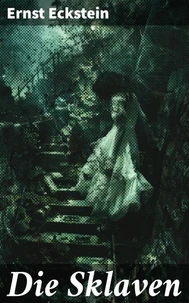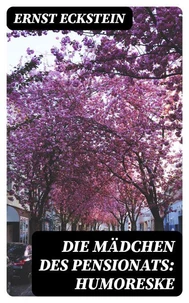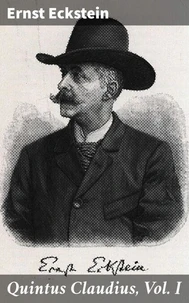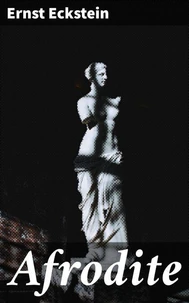Quintus Claudius (Vol. 1&2). Historical Novel – The Era of Imperial Rome
Par : ,Formats :
Disponible dans votre compte client Decitre ou Furet du Nord dès validation de votre commande. Le format ePub est :
- Compatible avec une lecture sur My Vivlio (smartphone, tablette, ordinateur)
- Compatible avec une lecture sur liseuses Vivlio
- Pour les liseuses autres que Vivlio, vous devez utiliser le logiciel Adobe Digital Edition. Non compatible avec la lecture sur les liseuses Kindle, Remarkable et Sony
 , qui est-ce ?
, qui est-ce ?Notre partenaire de plateforme de lecture numérique où vous retrouverez l'ensemble de vos ebooks gratuitement
Pour en savoir plus sur nos ebooks, consultez notre aide en ligne ici
- Nombre de pages506
- FormatePub
- ISBN859-65--4778820-1
- EAN8596547788201
- Date de parution24/12/2023
- Protection num.Digital Watermarking
- Taille1 Mo
- Infos supplémentairesepub
- ÉditeurGOOD PRESS
Résumé
In "Quintus Claudius" (Volumes 1 & 2), Ernst Eckstein crafts a richly woven narrative that transports readers to the political intrigues and cultural dynamics of ancient Rome. The novel is characterized by its meticulous attention to historical detail and vivid characterization, encapsulating the life of its titular protagonist, Quintus Claudius, against the backdrop of a society rife with ambition, corruption, and moral complexities.
Eckstein's stylistic finesse incorporates classical literary techniques, invoking the rhythm and cadence of Latin prose while engaging contemporary readers with its fluidity and emotional depth. Eckstein, a prominent 19th-century German novelist, was deeply influenced by his classical education and his fascination with Roman history. Born in a tumultuous era marked by social and political upheaval, his scholarly pursuits and immersion in literature inspired him to explore themes of identity, societal constructs, and the human condition within the framework of antiquity.
His own experiences and extensive studies of Roman society provide the foundation for "Quintus Claudius, " establishing a dialogue between the past and the present. This engaging two-volume work is highly recommended for readers interested in historical fiction that merges meticulous research with compelling storytelling. Eckstein'Äôs insights into human nature and societal values resonate through the ages, offering modern readers a thought-provoking perspective on the complexities of ambition and virtue in both ancient and contemporary contexts.
Eckstein's stylistic finesse incorporates classical literary techniques, invoking the rhythm and cadence of Latin prose while engaging contemporary readers with its fluidity and emotional depth. Eckstein, a prominent 19th-century German novelist, was deeply influenced by his classical education and his fascination with Roman history. Born in a tumultuous era marked by social and political upheaval, his scholarly pursuits and immersion in literature inspired him to explore themes of identity, societal constructs, and the human condition within the framework of antiquity.
His own experiences and extensive studies of Roman society provide the foundation for "Quintus Claudius, " establishing a dialogue between the past and the present. This engaging two-volume work is highly recommended for readers interested in historical fiction that merges meticulous research with compelling storytelling. Eckstein'Äôs insights into human nature and societal values resonate through the ages, offering modern readers a thought-provoking perspective on the complexities of ambition and virtue in both ancient and contemporary contexts.
In "Quintus Claudius" (Volumes 1 & 2), Ernst Eckstein crafts a richly woven narrative that transports readers to the political intrigues and cultural dynamics of ancient Rome. The novel is characterized by its meticulous attention to historical detail and vivid characterization, encapsulating the life of its titular protagonist, Quintus Claudius, against the backdrop of a society rife with ambition, corruption, and moral complexities.
Eckstein's stylistic finesse incorporates classical literary techniques, invoking the rhythm and cadence of Latin prose while engaging contemporary readers with its fluidity and emotional depth. Eckstein, a prominent 19th-century German novelist, was deeply influenced by his classical education and his fascination with Roman history. Born in a tumultuous era marked by social and political upheaval, his scholarly pursuits and immersion in literature inspired him to explore themes of identity, societal constructs, and the human condition within the framework of antiquity.
His own experiences and extensive studies of Roman society provide the foundation for "Quintus Claudius, " establishing a dialogue between the past and the present. This engaging two-volume work is highly recommended for readers interested in historical fiction that merges meticulous research with compelling storytelling. Eckstein'Äôs insights into human nature and societal values resonate through the ages, offering modern readers a thought-provoking perspective on the complexities of ambition and virtue in both ancient and contemporary contexts.
Eckstein's stylistic finesse incorporates classical literary techniques, invoking the rhythm and cadence of Latin prose while engaging contemporary readers with its fluidity and emotional depth. Eckstein, a prominent 19th-century German novelist, was deeply influenced by his classical education and his fascination with Roman history. Born in a tumultuous era marked by social and political upheaval, his scholarly pursuits and immersion in literature inspired him to explore themes of identity, societal constructs, and the human condition within the framework of antiquity.
His own experiences and extensive studies of Roman society provide the foundation for "Quintus Claudius, " establishing a dialogue between the past and the present. This engaging two-volume work is highly recommended for readers interested in historical fiction that merges meticulous research with compelling storytelling. Eckstein'Äôs insights into human nature and societal values resonate through the ages, offering modern readers a thought-provoking perspective on the complexities of ambition and virtue in both ancient and contemporary contexts.








